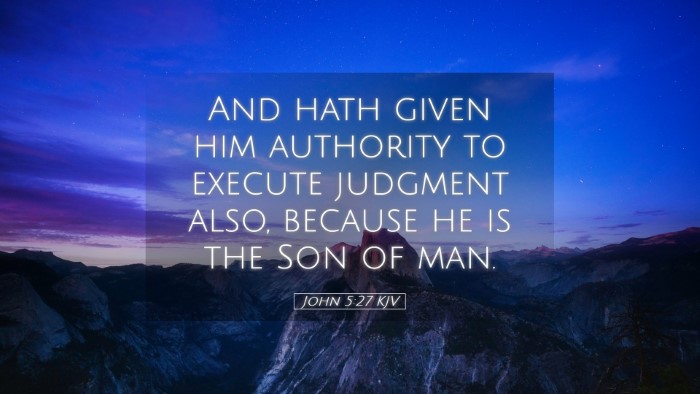Commentary on John 5:27
Verse: John 5:27 – "And has given Him authority to execute judgment also, because He is the Son of Man."
Introduction
This profound verse from the Gospel of John highlights the dual nature of Christ as both divine and human. The delegation of authority from the Father to the Son underscores the theological importance of Jesus’ identity and mission, especially concerning His role as the judge of humanity. This commentary draws insights from esteemed public domain commentaries by Matthew Henry, Albert Barnes, and Adam Clarke to provide a comprehensive understanding of John's message.
The Authority of Christ
The phrase "has given Him authority" highlights that Jesus’ power is not self-derived but bestowed by God the Father. Both Matthew Henry and Adam Clarke emphasize that this authority to judge is rooted in Christ's unique relationship with the Father and fulfills the prophetic scriptures. As a judge, He is qualified not only by divine appointment but also by His own experience as a man.
Divine Appointment
- Matthew Henry: Henry notes that this authority affirms Jesus' divine nature, as judgment belongs inherently to God alone. The scriptures often allude to God as the supreme judge, and here, Jesus, as the Son of Man, shares in this authority.
- Albert Barnes: Barnes points out that the judgment executed by the Son is thus both just and righteous, reflecting His intimate understanding of human nature, having shared fully in the human experience.
Son of Man
The title “Son of Man” carries rich implications. In the Old Testament, it appears in key prophetic texts, indicating a figure who would have authority over the kingdom of God. Adam Clarke elucidates that this title emphasizes Jesus’ humanity and His role as the representative of mankind.
The Purpose of Judgment
Understanding the purpose behind the authority to execute judgment is paramount. Matthew Henry indicates that this is not merely punitive; rather, it's a means of justice and restoration. Jesus’ judgment serves the dual purpose of vindicating God’s righteousness while also offering mercy to those who believe.
Justice and Mercy
- Albert Barnes: Barnes highlights that Jesus' willingness to judge is rooted in His love for humanity, as He desires all to come to repentance and knowledge of the truth.
- Adam Clarke: Clarke notes that this judgment is inevitable and reflects the seriousness with which Jesus regards sin, asserting that it is both an act of love and justice.
The Response of Humanity
In light of this authority, believers and non-believers alike must understand the implications of their response to Christ. The verse compels individuals to consider their relationship with Jesus as the judge of mankind.
Call to Action
- Matthew Henry: Henry encourages believers to approach judgment with humility and readiness, recognizing their need for grace while living according to Christ's teachings.
- Albert Barnes: Barnes emphasizes that a proper response leads to eternal life, as acceptance of Christ’s authority brings one into a relationship with the Divine Judge.
Conclusion
John 5:27 encapsulates the essence of Jesus Christ as both divine authority and human judge, inviting a serious contemplation of His role in the life of each believer. The reflection on His judgment combines aspects of justice and mercy, compelling a response that acknowledges His sovereign authority and the transformative nature of His grace. Pastors, students, and theologians are encouraged to delve deeply into the implications of this verse as part of their pursuit of understanding God's redemptive plan through Christ.


